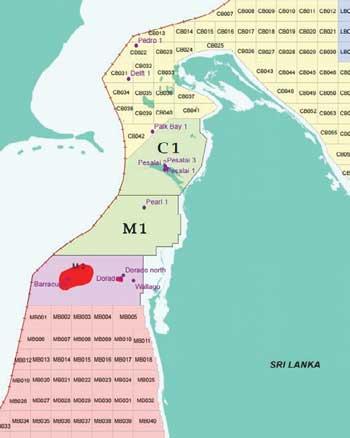Sri Lanka’s endeavors to attract and harness international investment in oil and gas exploration have once again encountered obstacles due to legal challenges in the Court of Appeal.
Plans were in motion to commercialize two blocks, contributing to over 5,000 square kilometers of potential oil and gas resources in the Mannar Basin.
In the latest developments in CA (Writ) Application No: 392/2023, the court acknowledged the establishment of a prima facie case by the petitioner, Serendive Energy.
Consequently, the court issued orders restraining the first to 36th respondents and/or their servants or agents from granting rights to offshore exploration of blocks M1 and C1 to any third party other than the petitioner until a final determination is reached in the case, Serendive Energy stated in a release.
Serendive Energy, in strategic alliance with a large Indian conglomerate, initiated legal actions following an attempt in 2023 to overturn the exploration block award previously conferred upon the company.
Participating in an open international tender (SL 2019-02) in 2019, Serendive Energy was awarded blocks Mannar Basin M1 and Cauvery Basin C1 in May 2021, following evaluations conducted by the Petroleum Development Authority, headed at the time by former Chairman Saliya Wickramasurity and current Chairman Surath Ovitigama, renowned domain experts in oil and gas.
International competitive bids were invited in 2019 for the exploration and production of oil and gas in Mannar Block M1 and Cauvery Block C1, with bid evaluation concluding in May 2021.
Negotiations between the government and Serendive Energy (Pvt.) Ltd. for separate petroleum resources agreements concerning the M1 and C1 blocks were underway throughout 2021, with approximately 90 percent of negotiations concluded. Finalization of the petroleum resources agreement was anticipated in the first half of 2022.
Although the awarding of blocks to Serendive Energy was seen as a significant step forward after previous setbacks, exploration activities came to a standstill during the country’s economic crisis, prompting numerous attempts to reverse the award. The petitioners argue that such actions directly contravene the Petroleum Act 2003.
Hydrocarbon prospectivity and legislation in Sri Lanka were established in 2001, with funding from the Asian Development Bank and technical assistance from New South Global, a part of the School of Petroleum Engineering at the University of New South Wales (UNSW) in Sydney, Australia.
Prof. Ray Shaw, the project’s team leader, concluded in the report, “The Gulf of Mannar basin represents a new deep-water frontier region, which has the potential to host significant hydrocarbon accumulations.”
The Petroleum Act 2003 was enacted by Parliament under the visionary leadership of the then Prime Minister Ranil Wickremesinghe. However, subsequent mismanagement and bureaucratic inaction hindered meaningful progress.
Source – dailymirror.lk












